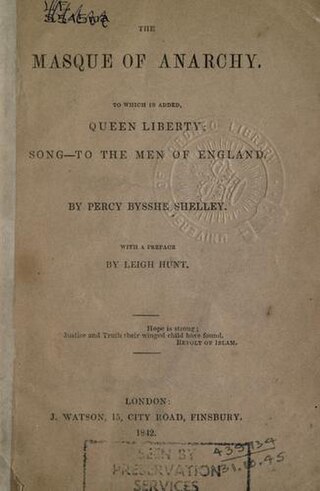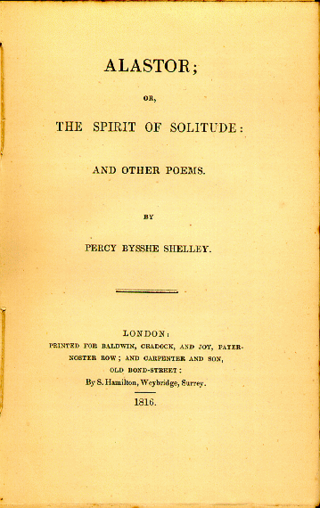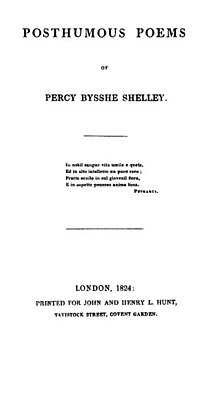
"Love's Philosophy" is a poem by Percy Bysshe Shelley published in 1819.

"To a Skylark" is a poem completed by Percy Bysshe Shelley in late June 1820 and published accompanying his lyrical drama Prometheus Unbound by Charles and James Ollier in London.

Berthold Goldschmidt was a German Jewish composer who spent most of his life in England. The suppression of his work by Nazi Germany, as well as the disdain with which many modernist critics elsewhere dismissed his "anachronistic" lyricism, stranded the composer in the wilderness for many years before he was given a revival in his final decade.

The Masque of Anarchy is a British political poem written in 1819 by Percy Bysshe Shelley following the Peterloo Massacre of that year. In his call for freedom, it is perhaps the first modern statement of the principle of nonviolent resistance.
Daniel Steven Crafts is an American composer. He was born in Detroit, Michigan, but has spent most of his life in the San Francisco Bay Area.
Nationality words link to articles with information on the nation's poetry or literature.
Nationality words link to articles with information on the nation's poetry or literature.

This is a bibliography of works by Mary Shelley, the British novelist, short story writer, dramatist, essayist, biographer, and travel writer, best known for her Gothic novel Frankenstein: or, The Modern Prometheus (1818). She also edited and promoted the works of her husband, the Romantic poet and philosopher Percy Bysshe Shelley. Until the 1970s, Mary Shelley was known mainly for her efforts to publish Percy Shelley's works and for Frankenstein. Recent scholarship has yielded a more comprehensive view of Mary Shelley’s achievements, however. Scholars have shown increasing interest in her literary output, particularly in her novels, which include the historical novels Valperga (1823) and Perkin Warbeck (1830), the apocalyptic novel The Last Man (1826), and her final two novels, Lodore (1835) and Falkner (1837). Studies of her lesser-known works such as the travel book Rambles in Germany and Italy (1844) and the biographical articles for Dionysius Lardner's Cabinet Cyclopaedia (1829–46) support the growing view that Mary Shelley remained a political radical throughout her life. Mary Shelley's works often argue that cooperation and sympathy, particularly as practised by women in the family, were the ways to reform civil society. This view was a direct challenge to the individualistic Romantic ethos promoted by Percy Shelley and Enlightenment political theories.

"In Moonlight" is a song with music written by the English composer Edward Elgar in 1904 to words from the poem "An Ariette for Music. To a Lady singing to her Accompaniment on the Guitar", by Percy Bysshe Shelley (1792-1822) and published in 1832.

Percy Bysshe Shelley was a British writer who is considered as one of the major English Romantic poets. A radical in his poetry as well as in his political and social views, Shelley did not achieve fame during his lifetime, but recognition of his achievements in poetry grew steadily following his death, and he became an important influence on subsequent generations of poets, including Robert Browning, Algernon Charles Swinburne, Thomas Hardy, and W. B. Yeats. American literary critic Harold Bloom describes him as "a superb craftsman, a lyric poet without rival, and surely one of the most advanced sceptical intellects ever to write a poem."
William Henry Bell, known largely by his initials, W H Bell, was an English composer, conductor and lecturer.

"A Dirge" is a poetic dirge composed by Percy Bysshe Shelley. It was published posthumously in 1824 by his wife, Mary Shelley, in the collection Posthumous Poems. The text has been set to music by Frank Bridge, Charles Ives, Ottorino Resphigi, Roy Ewing Agnew, and Benjamin Britten.

"One Word Is Too Often Profaned" is a poem by Percy Bysshe Shelley, written in 1822 and published in 1824.
Richard Collins St. Clair is an American composer, pedagogue, poet and pianist.

Posthumous Fragments of Margaret Nicholson was a collection of poetry published in November, 1810 by Percy Bysshe Shelley and his friend Thomas Jefferson Hogg while they were students at Oxford University. The pamphlet was subtitled: "Being Poems found amongst the Papers of that Noted Female who attempted the Life of the King in 1786. Edited by John Fitzvictor." The pamphlet was published by John Munday and Henry Slatter in Oxford and consisted of fictional fragments that were in the nature of a hoax and prank or burlesque.

The Triumph of Life was the last major work by Percy Bysshe Shelley before his death in 1822. The work was left unfinished. Shelley wrote the poem at Casa Magni in Lerici, Italy in the early summer of 1822. He modelled the poem, written in terza rima, on Petrarch's Trionfi and Dante's Divine Comedy.

"Mutability" is a poem by Percy Bysshe Shelley which appeared in the 1816 collection Alastor, or The Spirit of Solitude: And Other Poems. Half of the poem is quoted in his wife Mary Shelley's novel Frankenstein; or, The Modern Prometheus (1818) although his authorship is not acknowledged, while the 1816 poem by Leigh Hunt is acknowledged with the name of the author given. Only Percy Bysshe Shelley is not acknowledged as an author. There is also a prose version or further elaboration of the same themes of the poem in Frankenstein that immediately precedes the quotation of the poem.

Dr Benjamin Burrows was an English organist, pianist, music teacher, inventor, composer of art songs and instrumental music. He was known as a modest man and one of the finest teachers of his times.

Rosalind and Helen, A Modern Eclogue; With Other Poems is a poem collection by Percy Bysshe Shelley published in 1819. The collection also contains the poems "Lines written on the Euganean Hills", "Hymn to Intellectual Beauty", and "Sonnet. Ozymandias". The collection was published by C. and J. Ollier in London.

Posthumous Poems is a collection of poems by Percy Bysshe Shelley, with a preface by his widow Mary Shelley, which was published in 1824.













